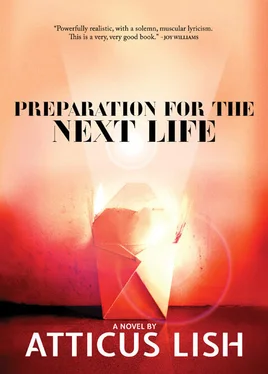She slapped a mosquito on her leg as she passed a white colonnaded funeral home surrounded by shaped hedges with a light box sign like a motel saying Have A Blessed Day and a name in flowery script. She passed a refrigerated shed for ice cubes outside a service station backed by trees. Voices reached her from someone filling up. She could smell the gasoline but couldn’t see who it was.
After what could have been another mile, she passed a CVS, brilliantly lit and silent, and then came to a stadium parking lot for a Super Stop & Shop, the asphalt buckled, carts left out at random.
A digital sign in front of the Valley National Bank said 4:59, 70°. She decided that this was the sign she had been looking for. Now I’ll turn, she said.
At the next street, she made a left, crossing behind a strip mall, hearing the hum of refrigeration out back of the loading dock and dumpsters, and started heading north.
She was on a smaller road and it was very dark and quiet and felt like the country. The road was lined with hedgerows higher than her head, so she was walking along a dark wall. There could have been country houses behind the hedges. Sometimes she glimpsed them. And there were trees yet higher than the hedges and homes. The sidewalk was narrow and hard to walk on and sometimes you couldn’t walk on it and she walked in the street, looking above the treetops to see if dawn was coming. The moon was over her left eye. She passed a hospital. A lighted bus kiosk. Dark soft greensward, hedges, flag poles. A chapel in white. The hospital’s campus numbered like an airport parking lot with light box signs: 1A, 2C, and so on. There were beds of flowers, the hum of ventilation. Sprinklers clicked on and started whisking on the grass. They wet her legs.
The eastern sky had shapes of light in it behind the puzzle pieces of clouds. A panel truck tore by and blew air over her. She crossed over a stone bridge above a parkway and saw her shadow on a Do Not Enter sign, posted at the onramp, meant for cars. She saw the morning star. The Lakeville Jewish Center. Countryside Montessori School. She got the sidewalk back — a thin ribbon between grass and fence. The sky had changed. Dawn was breaking. The blue gray light of dawn fell on everything — on her. The trees and leaves were silhouetted in sprays of leaves against the sky. She was passing through a vine-shrouded forest, willows, falling plants, beards of leaves, the giant faces of old bearded men rendered in leaves. She broke another spider web, actually saw the spider in the streetlight. It was very big: as big as two thumbs. They strung up nets from the telephone poles. She smelled the soil.
Because the shoulder was uneven, she walked in sand and gravel between the uncut grass and the white line. The odor of trees and grass was very strong. Pine also. She had to run up on the grassy shoulder when the cars sped past, and her sandals slipped. Her foot slipped and she broke a sandal. The toe piece popped out. She put it back together, birds calling around her.
Everywhere were trees. An oak had clouds of leaves. There were ivy cascades and split-rail fences. The moon looked like a tiny sun in the mist. In the east, she saw very pale pink on the clouds and pale blue where there was open sky. The pink was intensifying. All the light was different. She could see the road and herself in dim blue daylight.
At a highway, the asphalt smelled like oil and vulcanized tires. A sign said West 495 New York. In the bushes, the other sign said East 495 Riverhead. She had a great vivid panorama of the sunrise sky. The clouds grew in vaporous streaks, some ribbed like the glossy belly of a fish, as if they contained linear bones. These clouds caught the sun, which was as yet unseen. They looked like x-ray images — gauzy, overlapping, transparent.
She went under the highway and the air temperature in the underpass was warmer, like a dwelling. When she came out the other side, the new day was even brighter.
The road was dangerous; she couldn’t see who was coming and had to cross to the other side owing to the curve. She walked by a golf course, breaking through spider web after spider web and wiping them out of her hair. It seemed no one had walked here except for her. Four well-nourished older males in spandex and cleated shoes and protective helmets raced by on feather-light bicycles that whirred. The road began to go uphill and she was climbing now. She saw a gargantuan water tower on steel legs up ahead. A squirrel on the power lines. Leonardo’s La Dolce Vita. A circular driveway. Roman statues. Three-story office buildings. Vincent Jacone Laser Surgery. Marigolds, flowers, a basketball hoop. A forest-green truck with a yellow snow shovel. A tow truck: Appalachian. She smelled tires, gasoline. Saw a burned-out restaurant: Bombay Palace. The trees were far taller than the buildings, some of them firs. The Manhasset Fire Department was in a Dutch building. It was a lovely sunny early morning. At the top of the hill, she came to an intersection with a major road. She was breathing. She saw she had reached Northern Boulevard in Great Neck.
HE WENT UP THE hill, and when he came out of trees and the courtyard buildings, he passed the lot next to what used to be a drugstore, the broken glass on the asphalt under the amber streetlights. On the other side of the street there was a liquor store and he went into it. The store was a narrow tunnel. There was no door. You just went in, and the bottles went up to the ceiling. They sold McIvor in a gift box and Mr. Boston wine.
The Asian woman behind the Plexiglas had been here since the eighties, and she was nice, sort of a mom. Her large eyelids rose smoothly up to her forehead, uninterrupted by eyebrows, making it look as if she were surprised and delighted to see you.
Which one? she smiled, holding up different bottles of Bacardi. Skinner tapped the glass. That one.
Three old black guys in skullies came in with cigarettes drooping out of their mouths and one was saying, This motherfucker wants Chivas. Who you talkin bout? Softee? And Skinner slipped out past them carrying his bottle and went around the corner.
He went up the street looking for somewhere to drink. The side streets contained complexes of brown brick apartment buildings, a sun deck on every floor, seas of ferns in the alleys. He backed into a U-shaped hideout formed by three buildings and cracked his bottle and started drinking.
Five minutes later, a group of males gathered around a double-parked Lincoln. Skinner put his bottle away, thinking they could be undercovers. He got out of there and walked up the block. On the next corner, there were liquor stores, Chinese restaurants, Salvadoran restaurants, laundromats and a bar. He went to the bodega on the corner for cigarettes. Just give me one. Do you sell them loose? I can’t think that far ahead for a whole pack. Under the yellow awning, he lit up and sat on the pavement with the cigarette in his busted-up fingers from fighting, and concentrated on the smoke, his small red ember, the fume of tar in his nostrils, throat.
When his cigarette was over, he got up and crossed the avenue, which looked gray in the streetlights, and turned back onto one of the roads that ran parallel to the railroad — either Franklin or another one, but he did not care enough to tell which. After walking several minutes, he stopped where it was dark and took his bottle out again and started drinking alcohol as if it were spring water. He drank half, about 250 milliliters, in under five minutes. When the liquor hit his bloodstream, it staggered him — he couldn’t hold himself upright anymore. But this wasn’t enough for him. He drank the rest and then blacked out.
While unconscious, he found his way to a construction site somewhere down a dead-end street. He ripped the caution tape away from the rebar stakes in front of the house and stepped in wet cement. The house was covered in yellow exterior sheathing. He kicked his way through a plywood board that was supposed to keep people out and found the rubble where they were breaking up the old concrete slab. Under the streetlights, he started lifting up the stones and carrying them out of the house and down the road until he had to drop them. He left a scattering of one hundred twenty-pound stones strewn out on the asphalt.
Читать дальше












